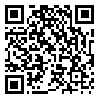Volume 26, Issue 3 (Autumn 2025)
jrehab 2025, 26(3): 422-445 |
Back to browse issues page
Download citation:
BibTeX | RIS | EndNote | Medlars | ProCite | Reference Manager | RefWorks
Send citation to:



BibTeX | RIS | EndNote | Medlars | ProCite | Reference Manager | RefWorks
Send citation to:
Ghovati F, Ashtari A, Soleimani F, Zarifian T, Vahedi M, Goshtai S M. An Investigation and Comparison of Early Communication Skills in Persian-speaking Children with Autism Spectrum Disorder Using Communication Skills Checklist (CSC). jrehab 2025; 26 (3) :422-445
URL: http://rehabilitationj.uswr.ac.ir/article-1-3632-en.html
URL: http://rehabilitationj.uswr.ac.ir/article-1-3632-en.html
Fateme Ghovati1 

 , Atieh Ashtari *2
, Atieh Ashtari *2 

 , Farin Soleimani3
, Farin Soleimani3 

 , Talieh Zarifian1
, Talieh Zarifian1 

 , Mohsen Vahedi4
, Mohsen Vahedi4 

 , Seyyede Masuomeh Goshtai5
, Seyyede Masuomeh Goshtai5 



 , Atieh Ashtari *2
, Atieh Ashtari *2 

 , Farin Soleimani3
, Farin Soleimani3 

 , Talieh Zarifian1
, Talieh Zarifian1 

 , Mohsen Vahedi4
, Mohsen Vahedi4 

 , Seyyede Masuomeh Goshtai5
, Seyyede Masuomeh Goshtai5 

1- Department of Speech Therapy, Pediatric Neurorehabilitation Research Center, School of Rehabilitation Sciences, University of Social Welfare and Rehabilitation Sciences, Tehran, Iran.
2- Department of Speech Therapy, Pediatric Neurorehabilitation Research Center, School of Rehabilitation Sciences, University of Social Welfare and Rehabilitation Sciences, Tehran, Iran. ,at.ashtari@uswr.ac.ir
3- Pediatric Neurorehabilitation Research Center, University of Social Welfare and Rehabilitation Sciences, Tehran, Iran.
4- Department of Biostatistics and Epidemiology, School of Social Health, University of Social Welfare and Rehabilitation Sciences, Tehran, Iran.
5- Department of Health Education and Promotion, Deputy of Health, Iran university of Medical Sciences, Tehran, Iran.
2- Department of Speech Therapy, Pediatric Neurorehabilitation Research Center, School of Rehabilitation Sciences, University of Social Welfare and Rehabilitation Sciences, Tehran, Iran. ,
3- Pediatric Neurorehabilitation Research Center, University of Social Welfare and Rehabilitation Sciences, Tehran, Iran.
4- Department of Biostatistics and Epidemiology, School of Social Health, University of Social Welfare and Rehabilitation Sciences, Tehran, Iran.
5- Department of Health Education and Promotion, Deputy of Health, Iran university of Medical Sciences, Tehran, Iran.
Abstract: (2066 Views)
Objective Early communication skills, which emerge during the prelinguistic period, form the essential foundation for later language development in typically developing (TD) children and in children with communication disorders. Children with autism spectrum disorder (ASD) often exhibit significant deficits in these skills. This study aimed to investigate early communication skills in minimally verbal or nonverbal Persian-speaking children with ASD compared to their TD peers.
Materials & Methods This cross-sectional study included two groups of Persian-speaking children, 70 with ASD, divided into three age groups (3, 4, and 5 years), and 132 TD children divided into four age groups (9, 10, 11, and 12 months). Children with ASD had a maximum of 3 to 5 spontaneous expressive words based on the MacArthur-Bates communicative development inventories (CDI-1). The communication skills were evaluated using the communication skills checklist (CSC) and were compared between age groups and between the two study groups.
Results No significant differences were observed between children with ASD aged 3-5 years and TD children aged 9-11 months in the CSC domains (P>0.05). However, significant differences were found between ASD children and TD children aged 12 months in all CSC domains and between ASD children and TD children aged 9-11 months in the communication domain (assessing gesture use, eye contact and communicative function), with the ASD group scoring lower (P<0.001). One-way ANOVA results revealed no significant differences in the CSC scores among age groups of the ASD children (P>0.05), but significant differences among TD children’s age groups were reported, with older children having higher scores (P<0.001).
Conclusion Despite being older, children with ASD have notable delays in all early communication skills compared to 12-month-old TD children. These underscore the need for early screening and intervention targeting early communication skills in children with ASD to support language and communication development in these children.
Materials & Methods This cross-sectional study included two groups of Persian-speaking children, 70 with ASD, divided into three age groups (3, 4, and 5 years), and 132 TD children divided into four age groups (9, 10, 11, and 12 months). Children with ASD had a maximum of 3 to 5 spontaneous expressive words based on the MacArthur-Bates communicative development inventories (CDI-1). The communication skills were evaluated using the communication skills checklist (CSC) and were compared between age groups and between the two study groups.
Results No significant differences were observed between children with ASD aged 3-5 years and TD children aged 9-11 months in the CSC domains (P>0.05). However, significant differences were found between ASD children and TD children aged 12 months in all CSC domains and between ASD children and TD children aged 9-11 months in the communication domain (assessing gesture use, eye contact and communicative function), with the ASD group scoring lower (P<0.001). One-way ANOVA results revealed no significant differences in the CSC scores among age groups of the ASD children (P>0.05), but significant differences among TD children’s age groups were reported, with older children having higher scores (P<0.001).
Conclusion Despite being older, children with ASD have notable delays in all early communication skills compared to 12-month-old TD children. These underscore the need for early screening and intervention targeting early communication skills in children with ASD to support language and communication development in these children.
Type of Study: Original |
Subject:
Speech & Language Pathology
Received: 5/05/2025 | Accepted: 23/09/2025 | Published: 1/10/2025
Received: 5/05/2025 | Accepted: 23/09/2025 | Published: 1/10/2025
Send email to the article author
| Rights and permissions | |
 |
This work is licensed under a Creative Commons Attribution-NonCommercial 4.0 International License. |





